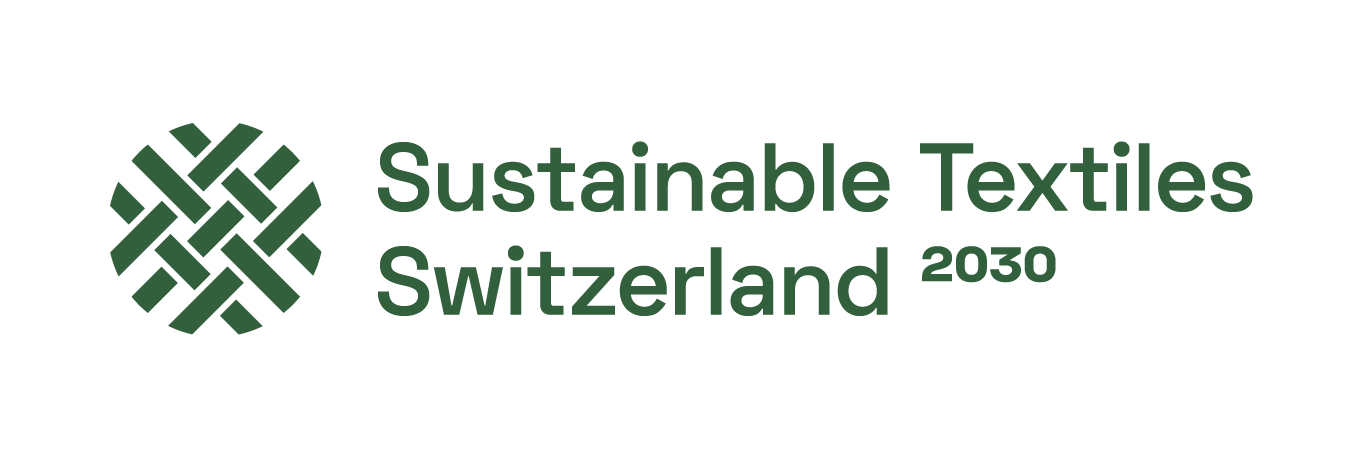Tools
The STS 2030 toolbox is the toolbox for achieving the STS 2030 Targets and is intended to enable the committed actors to implement the measures to achieve the Targets through a range of offers. It is made up of tools and events and is a living instrument that is constantly being further developed.
The tools only list support options that are geared towards the measures for achieving the STS 2030 Targets. The tools only offer a selection from the huge range of support options. However, the responsibility for implementation remains with the companies.
The roadmap shows the timeline for implementing the measures and serves as the basis for using the tools. Various introductory consultations are offered to get you started in the respective subject area (filter options). Use the roadmap and the filter function to find the right support offer.
Target 1: Reduction of greenhouse gas emissions.
By 2030, greenhouse gas emissions in the Swiss textile and clothing industry will be reduced by 50% with the aim of achieving a net zero target by 2050.
Measures taken by the committed actors:
Measure 1.1: Committed actors record the greenhouse gas emissions in their supply chains (Scope 1, 2 & 3) within 18 months in accordance with the GHG Protocol.
Measure 1.2: Committed actors set themselves ambitious science-based reduction targets within 24 months.
Measure 1.3: Committed actors reduce emissions according to their individual reduction pathway.
Target 2: Promote fair wages and decent work for all.
By 2030, 100% of the Swiss textile and clothing sector is implementing its due diligence obligations across the entire supply chain, with a focus on working hours, forced labor, child labor, sexual harassment and wages.
Measures taken by the committed actors:
Measure 2.1: Committed actors establish an internal due diligence process in accordance with the OECD within 18 months and become a member/partner in at least one specific program that aims to achieve this goal.
Measure 2.2: Committed actors develop their own strategy within 18 months in which they define how they want to work with suppliers to support them in preventing child labor, forced labor, sexual harassment and excessive working hours.
Measure 2.3: Committed actors define their own roadmap within 24 months with influence on the entire supply chain in order to directly or indirectly achieve fair remuneration in accordance with the OECD.
Measures 2.4: Committed actors implement their own strategy and roadmap with influence on the entire supply chain to prevent child labor, forced labor, sexual harassment and excessive working hours, and to directly or indirectly achieve fair pay in accordance with the OECD by 2030.
Target 3: Promote innovative business models towards a circular economy.
By 2030, at least 30% of sales in the Swiss textile and clothing sector will be generated with products designed according to circular economy principles.
Measures taken by the committed actors:
Measure 3.1: Committed actors fulfill at least two of the four options (mixed forms are possible):
- 3.1.1: By 2025/2030, committed actors design at least 15%/30% of their products in such a way that they circulate in a functioning cycle.
- 3.1.2: Committed actors reuse at least 20%/50% of textile materials in new products by 2025/2030
- 3.1.3: Committed actors are actively involved within 24 months in emerging pilot projects for the development of recycling systems for textiles and contribute to their establishment with their know-how and testing possibilities.
- 3.1.4: Committed actors adapt their business models by 2025 so that customers are involved in the reuse (e.g. re-sale, repair, etc.) of products.
Measure 3.2:Committed actors implement a chemicals management system for their supply chain to protect biodiversity by 2025.
Target 4: Transparency to ensure that sustainable purchasing decisions can be made.
By 2030, 80% of the Swiss textile and clothing industry will disclose information on social and environmental sustainability.
Measure 4.1: Committed actors establish a proactive information policy within 18 months and disclose their sustainability strategy, supply chain policy, measures and successes.
Measure 4.2: Committed actors take measures within 24 months to contribute to better knowledge about the sustainability aspects of textile products.
Measure 4.3: Committed actors enable consumers to access sustainability information on the product by 2025 and on the production sites of the products by 2028 for at least 80% of their products.
Target
Measure
- All Measures
- Measure 1.1: Measurement of greenhouse gas emissions
- Measure 1.2: Setting reduction targets
- Measure 1.3: Reduction of emissions
- Measure 2.1: Establishment of due diligence
- Measure 2.2: Development of an enhanced working conditions strategy
- Measure 2.3: Definition of a fair wages roadmap
- Measure 2.4: Implementation of the strategy and roadmap
- Measure 3.1: Circular economy business models
- Measure 3.1.1: Design of recyclable products
- Measure 3.1.2: Reuse of textile materials
- Measure 3.1.3: Commitment to pilot projects for recycling systems
- Measure 3.1.4: Adaptation of business models
- Measure 3.2: Implementation of chemicals management
- Measure 4.1: Establishment of information policy
- Measure 4.2: Contribution to sustainability knowledge
- Measure 4.3: Sustainability information on products and production facilities
Target Group












Do you have any feedback?
Or are you missing a support offer for implementing a measure or achieving a Target? Do you have an approach that enables the committed actors to achieve the Targets? Please write us. We look forward to hearing from you.
